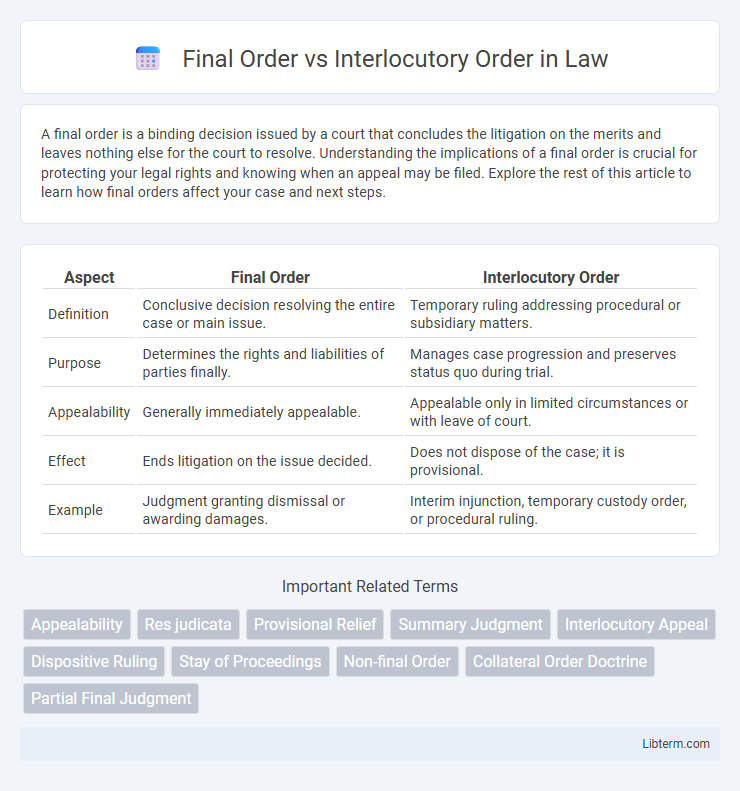A final order is a binding decision issued by a court that concludes the litigation on the merits and leaves nothing else for the court to resolve. Understanding the implications of a final order is crucial for protecting your legal rights and knowing when an appeal may be filed. Explore the rest of this article to learn how final orders affect your case and next steps.
Table of Comparison
| Aspect | Final Order | Interlocutory Order |
|---|---|---|
| Definition | Conclusive decision resolving the entire case or main issue. | Temporary ruling addressing procedural or subsidiary matters. |
| Purpose | Determines the rights and liabilities of parties finally. | Manages case progression and preserves status quo during trial. |
| Appealability | Generally immediately appealable. | Appealable only in limited circumstances or with leave of court. |
| Effect | Ends litigation on the issue decided. | Does not dispose of the case; it is provisional. |
| Example | Judgment granting dismissal or awarding damages. | Interim injunction, temporary custody order, or procedural ruling. |
Understanding Final Orders
Final orders conclusively resolve the substantive issues in a legal case, determining the rights and obligations of the parties involved, and ending the litigation on those matters. They are immediately enforceable and subject to appeal, unlike interlocutory orders which are provisional and address procedural or preliminary issues during the course of the case. Understanding final orders requires recognizing their binding effect and their role in delivering a definitive judgment that concludes the trial or litigation process.
Defining Interlocutory Orders
Interlocutory orders are temporary or provisional rulings issued during the course of a legal proceeding, addressing procedural or intermediate matters without concluding the entire case. These orders resolve specific issues, such as granting or denying injunctions, managing evidence, or scheduling hearings, and remain effective until the final order is issued. Unlike final orders, interlocutory orders are not conclusive and typically cannot be appealed immediately, as they do not determine the ultimate rights of the parties involved.
Key Differences Between Final and Interlocutory Orders
Final orders conclusively resolve the main issues in a case, effectively ending the litigation on the merits and are immediately appealable. Interlocutory orders address procedural or interim matters without settling the core dispute and typically require the case to proceed further before appeal. The distinction centers on finality, appealability, and whether the order disposes of substantive rights or merely manages ongoing litigation.
Legal Significance of Final Orders
Final orders conclude litigation by resolving the main issues and determining the parties' rights, making them immediately enforceable and subject to appeal. They provide legal certainty by bringing a definitive end to a case, unlike interlocutory orders which address procedural or preliminary matters without deciding the core dispute. Courts rely on final orders to ensure the administration of justice through final judgments that can be conclusively reviewed by appellate courts.
Impact of Interlocutory Orders on Litigation
Interlocutory orders play a crucial role in shaping the progression of litigation by addressing urgent or procedural issues before the final decision. These orders can significantly influence the strategy and outcome of a case by affecting evidence admissibility, interim relief, or trial conduct. Unlike final orders that conclude litigation, interlocutory orders ensure procedural fairness and can be subject to immediate appeals, potentially altering the course and duration of the lawsuit.
Appealability: Final vs Interlocutory Orders
Final orders conclusively resolve the entire litigation and are immediately appealable as they determine the rights of the parties. Interlocutory orders address preliminary or procedural issues without ending the case and generally are not appealable until a final order is rendered, except under specific circumstances or statutory exceptions. Courts allow interlocutory appeals only when delay would cause irreparable harm or when the order involves a controlling question of law.
Examples of Final Orders in Practice
Final orders in legal practice include judgments that conclude a case, such as a court's decision in a civil lawsuit awarding damages or dismissing claims entirely. Another example is a divorce decree that legally terminates a marriage and resolves related issues like property division and child custody. Unlike interlocutory orders, which address preliminary or procedural matters, final orders definitively settle the substantive rights of the parties involved.
Common Scenarios Involving Interlocutory Orders
Interlocutory orders frequently arise in common scenarios such as injunctions, interim custody arrangements, or discovery disputes, serving as provisional rulings during litigation. Unlike final orders that conclude the case, interlocutory orders address urgent issues requiring immediate judicial intervention to maintain status quo or prevent harm. Courts often issue interlocutory orders to manage procedural matters, resolve preliminary disputes, or facilitate fair trial conduct before rendering a final decision.
Strategic Considerations for Legal Practitioners
Final orders conclusively resolve the entire dispute, enabling legal practitioners to strategize for immediate appeal or enforcement, while interlocutory orders address preliminary or procedural matters, often affecting trial conduct and broader case dynamics. Strategic considerations involve assessing the timing and impact of challenging interlocutory orders to avoid unnecessary delays and potential waiver of issues on appeal. Mastery of jurisdictional nuances and appellate standards for both types of orders empowers legal practitioners to optimize case outcomes effectively.
Conclusion: Choosing the Right Legal Path
Final orders conclusively determine the rights and liabilities of parties, providing a definitive resolution to a case. Interlocutory orders address procedural or preliminary issues, often requiring further judicial examination before final judgment. Selecting the appropriate legal path depends on whether an immediate, binding decision is necessary or if resolving interim matters will better support the case's ultimate resolution.
Final Order Infographic

 libterm.com
libterm.com